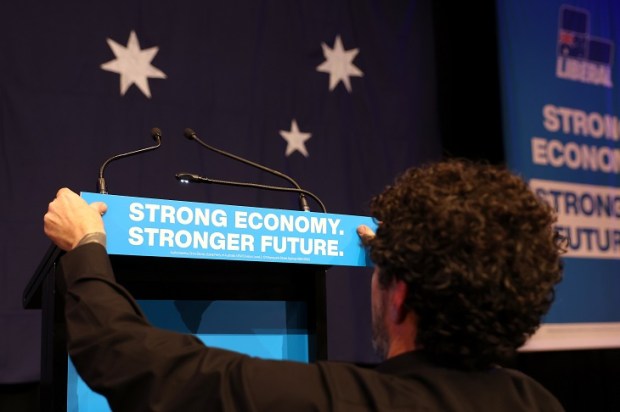Greens Senator Peter Whish-Wilson has received advice from the Clerk of the Senate, Rosemary Laing, that the Senate and House of Representatives could launch a Parliamentary Commission of Inquiry into the banks when parliament resumes next week. This would have similar powers to a Royal Commission into banking which the government has refused to establish.
A Parliamentary Commission of Inquiry into the banks cannot be established without government agreement. At least not unless a majority of House of Representative members are willing to bring down the government.
The Senate cannot establish a Royal Commission. This can only be done by the Governor-General issuing what are called Letters Patent. This is usually done under the Royal Commissions Act, 1902, or under the Royal Prerogative, that it is the power of the Crown to act without legislation. Needless to say, the Governor-General only does this with the advice of the government.
The Clerk’s advice envisages an alternative to a Royal Commission, a Parliamentary Commission of Inquiry. Such a commission is rare. It advises the Parliament, while a Royal Commission advises the executive government.
A Parliamentary Commission of Inquiry was established by legislation in 1986 to advise whether Mr Justice Lionel Murphy should be removed from the High Court. Under section 72 of the Constitution, a judge can only be removed by the Governor-General on an address from both Houses praying for such removal on the ground of proved misbehaviour or incapacity. So it was entirely appropriate to establish such a commission to advise the houses of parliament in exercising their power to initiate the removal of the judge. A Royal Commission advising the government would have been entirely inappropriate.
Ms Laing says that the parliamentary, constitutional and procedural barriers and challenges in establishing a Parliamentary Commission of Inquiry into the banks are ‘numerous.’
Not only are they numerous, at least one is insurmountable.
First, as she points out, the funding of a Parliamentary Commission of Inquiry would be in the hands of the government. The Constitution provides that an appropriation of money can only be approved unless it is recommended in a message from the Governor-General, acting of course in our constitutional monarchy on the advice of the government. So if the government does not want a Parliamentary Commission of Inquiry into the banks, it will not be funded. Everyone, including the commissioner or commissioners and counsel, the assistants and guards, would have to work pro bono.
There is a more serious barrier, and this will ensure that unless the government changes its mind, there will be no Parliamentary Commission of Inquiry.
The legislation establishing the Murphy Parliamentary Commission of Inquiry was fully supported by the government of the day.
It was given Royal Assent by the Governor-General. The Clerk does not seem to acknowledge the need for this.
This is absolutely necessary as the Constitution provides that the legislative powers of the Commonwealth are vested in a Federal Parliament consisting of the Queen, a Senate and a House of Representatives.
As to a Parliamentary Commission of Inquiry into the banks, it would be quite possible for a bill for this to be passed by the Senate.
It is also possible, but unlikely, that it would be passed by the House of Representatives against the wishes of the government. It is hard to imagine that the government would declare in advance that it would not treat the vote on the bill as a question of confidence. So members would be on notice that if the bill were passed the government could take this as a vote of no confidence and resign. It would not be obliged to resign but the possibility would be there.
So let us imagine the unlikely.
With the bill approved by the Senate and with some members willing to cross the floor, the Prime Minister concludes he is likely to lose the vote in the House. He then announces that the government will not regard this as a question of confidence and will not resign. This will of course encourage more MP’s to support the bill as they will be assured this will not bring down the government.
In this imaginary situation the bill could thus pass both houses against the wishes of the government.
That is not the end of the matter, as the Clerk’s advice seems to indicate.
Let us assume, as is likely, that the Prime Minister then advises the Governor-General not to give Royal Assent. Not being a matter involving the reserve powers, the Governor-General would and should accept that advice.
Unless a subsequent vote of no confidence is then passed by the House bringing down the government, nothing will happen.
The exercise will have been highly newsworthy but utterly pointless. Parliament will be a laughing stock.
Rather than going through this and achieving nothing, the Senate would be better advised to refer the issue to one of its many committees. In other words, if they want an inquiry and the government won’t give them a Royal Commission with an eminent lawyer presiding, they should do their own. They should forget a Parliamentary Commission of Inquiry.
True, senate reports can of course be highly partisan with majority and minority reports. But they can also reveal relevant information and case studies which can lead to reform.
The villains of the piece: bankers or governments?
That said, there are in my view, more than sufficient grounds for a Royal Commission into aspects of the banks’ behaviour.
This should not be in relation to the alleged failure to pass on the more and more desperate reductions by the Reserve Bank of the target ‘cash rate’, the market interest rate on overnight funds. First, the rates on house mortgages are not directly related to the cash rate. Second, if there is evidence of collusion on this, the Trade Practices Act already provides a remedy. But there is no serious allegation of this.
A Royal Commission would be justified into allegations of unconscionable behaviour by the banks. Serious and well documented examples include the numerous instances of foreclosure against drought ridden farmers who are completely up-to-date on all payments of interest and principal but where the value of the farm has fallen. These examples could not be adequately answered by annual appearances before some committee. Having myself appeared before such committees it is obvious that MPs and senators are rarely qualified for this role. They too often forsake the role of inquisitor to make pointless and superfluous partisan speeches posing as questions. I have also seen such a tendency when I have chaired inquiries by other committees.
A more general issue should also be the subject to a Royal Commission. That is in abandoning the previous Australian practice of inserting a state owned or mutually owned entities in an oligopolistic market, that is one where there are only a handful of effective players. In a market dominated by a few corporations whose mission is to maximise their profits, competition tends to move away from price competition. Competition tends to more about such matters as advertising and brand differentiation with minimal benefit to the consumer. Prices move to the price which a single monopoly could impose, the corporations tending to act as one. This can be achieved through, for example, one of the corporations being accepted as a price leader. Such ‘conscious parallelism’ does not in itself constitute an offence under the Trade Practices Act.
The best way to encourage both price competition and conscionable behaviour is in the presence of state owned or mutually owned entities in the mix.
We had this in banking and insurance. But the Commonwealth Bank and various state banks were sold by the politicians, Labor, Liberal and National. This was not to make other investments for the people. This was to waste the capital on recurrent expenditure. It is as foolish as selling your house and spending the proceeds on high living over one year. But politicians did it.
Then the carpetbaggers moved on the mutual companies, those owned by the insured or the borrowers and which had consequently charged competitive prices. This was especially in insurance. The present generation of owners were tempted to sell off the accumulated work of generations, usually for a pittance, while the usual suspects, including their lawyers and brokers, were vastly enriched. The politicians stood by, their retired colleagues sometimes involved.
Yes there are grounds for a Royal Commission but would the politicians allow an investigation into the way they and their predecessors behaved?
Got something to add? Join the discussion and comment below.
Get 10 issues for just $10
Subscribe to The Spectator Australia today for the next 10 magazine issues, plus full online access, for just $10.

























Comments
Don't miss out
Join the conversation with other Spectator Australia readers. Subscribe to leave a comment.
SUBSCRIBEAlready a subscriber? Log in